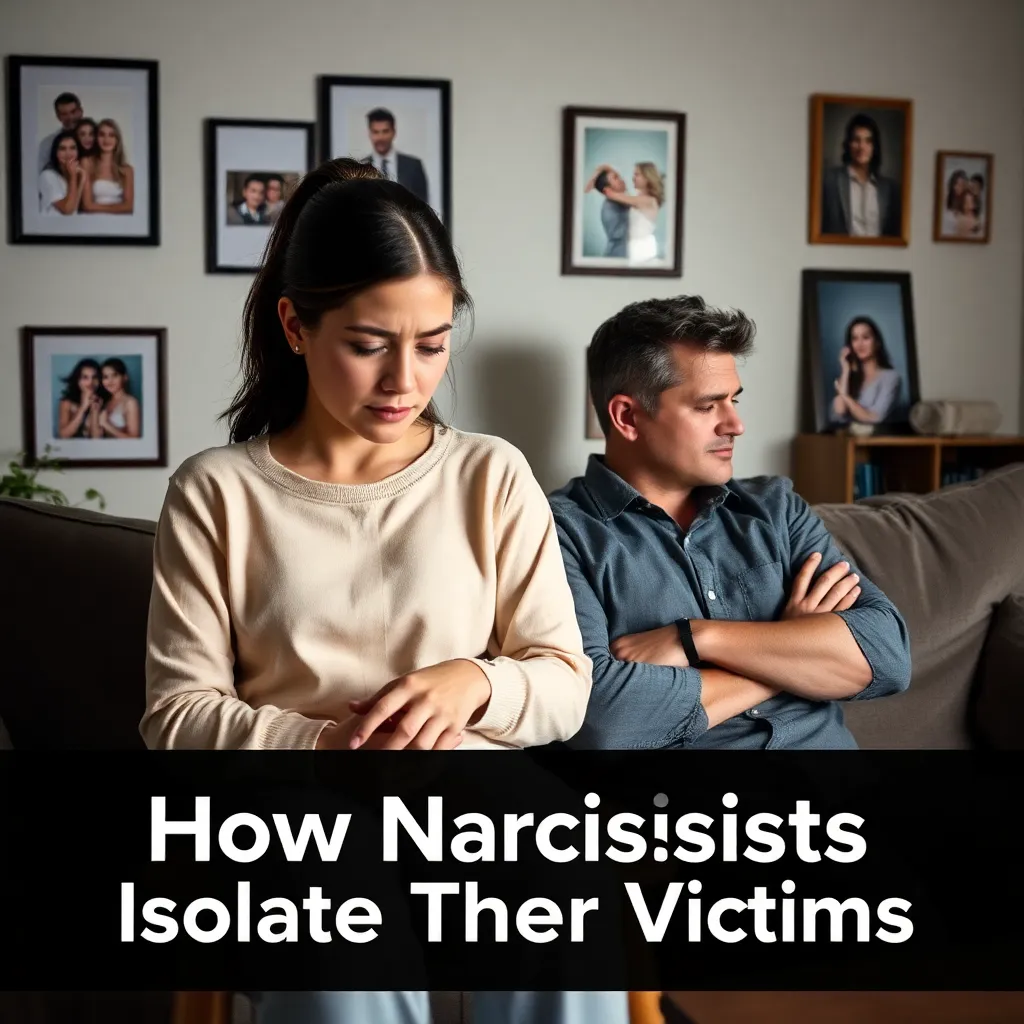In the intricate web of relationships, feeling isolated can be both confusing and deeply unsettling. If you’ve found yourself feeling cut off from friends and family, wondering how you arrived at this lonely place, know that you are not alone in your experience. Understanding the subtle tactics that narcissists use to isolate their victims can be an empowering step toward reclaiming your sense of self and reestablishing connections with those who truly care about you.
Recognizing the signs of narcissistic isolation is crucial, as it often happens gradually and under the guise of love or concern. This article will delve into the strategies narcissists employ to create emotional and social barriers around their victims, helping you identify these behaviors in your own life. By shedding light on these tactics, we aim to provide you with the knowledge and tools needed to break free from their grasp and rebuild your support network.
As you read on, you’ll gain insights into the emotional manipulation and control mechanisms at play in these relationships. We will explore practical steps you can take to protect yourself and navigate a path toward healthier, more fulfilling connections. By the end of this article, you will have a clearer understanding of how to recognize and resist isolation tactics, fostering a renewed sense of empowerment and hope.
1. Recognizing Narcissistic Behaviors

Recognizing the subtle signs of a narcissist can be challenging, especially when their behaviors initially appear charming and charismatic. Over time, however, these individuals often display a pattern of behavior that is far from healthy, leading to feelings of confusion and self-doubt in their partners.
Imagine being in a relationship where your partner slowly begins to undermine your confidence by dismissing your achievements or belittling your feelings. This is a common tactic used by narcissists to gain control, often leaving their partners questioning their own worth and capabilities.
According to experts, narcissists often engage in gaslighting, a manipulative tactic that makes their victims doubt their own perceptions and realities. By twisting facts or denying occurrences, they can make you feel like you’re losing your grip on what’s real, further isolating you from your support system.
It’s crucial to recognize these patterns early on to protect your emotional well-being. Engaging in open conversations with trusted friends or a therapist can provide much-needed perspective and support when navigating these relationships.
Ultimately, understanding these behaviors is the first step towards regaining control and ensuring your relationships are built on mutual respect and understanding. Trust your instincts and remember that healthy relationships foster growth, not isolation.
2. Tactics Used to Isolate Victims

Narcissists often use subtle yet impactful tactics to gradually isolate their victims from friends and family. For instance, they may begin by subtly criticizing a partner’s friends, sowing seeds of doubt about their intentions or loyalty.
In many cases, a narcissist will play the role of the misunderstood hero, claiming that others just don’t understand them like their partner does. This can create a sense of exclusivity between the couple, leading the victim to feel that their partner is the only one who truly cares.
Another common strategy involves the narcissist creating scenarios that require the victim to choose between them and their loved ones. Over time, these conflicts often lead the victim to spend more time and energy on the relationship, further isolating them from their support network.
Experts suggest that these tactics are designed to make the victim more dependent on the narcissist, reducing their ability to seek outside perspectives. Relationship counselor Dr. Emily Tran notes that maintaining connections with friends and family is crucial for emotional well-being.
It’s essential to recognize these isolation tactics early and take steps to maintain a healthy balance in your relationships. By doing so, you can preserve your sense of self and ensure you have a strong support system in place.
3. Emotional Manipulation Techniques Explained

Narcissists often engage in emotional manipulation to further isolate their victims. They might leverage a victim’s past insecurities against them, making the victim feel unworthy of love from others. Imagine a scenario where a partner repeatedly questions their significant other’s friendships, suggesting they’re not genuine or that they gossip behind their back. Over time, the victim starts to doubt their own perceptions and withdraws from meaningful connections.
Another common technique is the use of gaslighting, where the narcissist makes their victim question their own reality. This can look like denying events ever happened or dismissing the victim’s feelings as overreactions, leaving them feeling confused and isolated. For example, if a partner insists that an argument never occurred, it can lead the victim to doubt their memory and rely more heavily on the manipulator for validation. The victim becomes increasingly dependent, feeling that they can no longer trust their own mind.
Narcissists may also employ love-bombing, overwhelming their victims with affection and attention, only to later withdraw it without warning. This creates a cycle of addiction to the highs of affection and the lows of rejection, making the victim feel as if they must work harder to regain the narcissist’s approval. During the withdrawal phase, the victim often feels they have no one else to turn to, reinforcing their isolation. This unpredictable behavior keeps the victim on edge, constantly trying to please the narcissist.
Recognizing these manipulation techniques is the first step in breaking free from their grasp. By understanding the patterns and seeking external support, victims can begin to rebuild their sense of self-worth and trust in their own perceptions. Remember, the journey to breaking free from isolation is challenging, but with awareness and support, it’s entirely possible. By taking small, deliberate steps, one can gradually regain independence and emotional health.
4. Impact of Isolation on Victims

When a narcissist isolates their victim, the impact can be profoundly damaging. Victims often experience a deep sense of loneliness and helplessness, feeling trapped in a world where their only connection is with their manipulator.
Consider the story of Sarah, who gradually stopped seeing her friends because her partner constantly found faults in them. Such situations are common, where victims feel they must choose between their relationships and their partner, leading to a gradual erosion of their support network.
Experts highlight that isolation can lead to long-term mental health issues like anxiety and depression. Without the support of loved ones, victims often lose their sense of identity and find it difficult to trust their own judgment.
To counteract isolation, it is crucial to reconnect with trusted friends and family, even if it feels challenging. Small steps, like sending a text or attending a casual meetup, can gradually rebuild those essential connections.
Ultimately, understanding the impact of isolation empowers victims to seek help and rebuild their lives. Remember, no one deserves to feel alone, and there is always hope for healing and reconnection.
5. Steps to Reclaim Independence

Reclaiming your independence after experiencing isolation can feel daunting, but it is an essential step toward healing. Imagine a garden that has been neglected; with consistent care, it can bloom beautifully again. Start by reconnecting with old friends or family members who once provided support and comfort. This reconnection can help rebuild your social network and remind you of the love that still surrounds you.
It can be helpful to set small, achievable goals to regain confidence in your independence. For example, consider joining a local class or club where you can meet new people and explore interests that you might have neglected. Creating a daily routine that prioritizes self-care and personal growth can also be transformative. This might include activities like journaling, exercise, or meditation to help strengthen your sense of self.
Seeking professional guidance from a therapist can provide you with the tools needed to navigate this journey. A therapist can offer valuable insights into the patterns of behavior that led to isolation and help you develop strategies to avoid them in the future. Surround yourself with positive influences that encourage your growth and independence. These influences can be found through support groups or online communities where shared experiences offer strength and understanding.
Remember, reclaiming independence is a journey that takes time and patience, but each step forward is a victory. It is important to celebrate your progress, no matter how small, as it reinforces your strength and resilience. This journey toward independence is not just about physical freedom but also about rediscovering your inner voice and confidence. With each empowering decision, you pave the way for a healthier, more fulfilling future.
Conclusion: Creating Beautiful Outdoor Spaces
In navigating the complex dynamics of relationships with narcissists, it’s crucial to recognize how they employ isolation tactics to control their partners. This article explored five key concepts: understanding emotional manipulation, recognizing the signs of isolation, building a support network, reclaiming personal autonomy, and fostering emotional resilience. By understanding these strategies, you can begin to protect yourself and cultivate healthier relationship dynamics.
As an immediate next step, take a moment today to reach out to a trusted friend or family member and share your thoughts and experiences. Opening up to others can be a powerful way to break the cycle of isolation and reaffirm your sense of self.
Remember, safeguarding your emotional well-being is a journey, and having reliable resources at your fingertips can be invaluable. Bookmark this article as a reminder of the steps you can take and the signs to watch for in your relationships.
Looking forward, envision a future where your relationships are grounded in mutual respect and understanding. With awareness and proactive steps, you can create a more fulfilling and balanced connection with yourself and others. You have the power to transform your relationship experiences—take the first step today.
